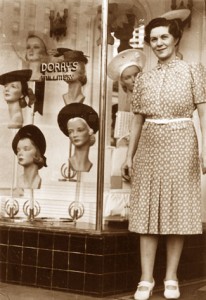The Family Store is a 12-panel exhibit that was displayed in a variety of locations in downtown Asheville in the fall of 2006 and spring 2007.
This exhibit spotlights the more than 450 Jewish businesses found in the main core of downtown Asheville which is smaller than the downtown of today. It showcases the era when all downtowns were destinations of purpose, providing most necessities for daily life, from groceries to clothing. It was a time when downtown Asheville was the shopping hub of Western North Carolina.
 The Jewish community of that period made a variety of contributions to western North Carolina. Some were anonymous, some not. Some were monetary and some were donations of time and resources highlighting their strong feeling of social responsibility regardless of race or religion. These contributions were disproportionate to the small numbers of Jews in the local population. Some examples include the many buildings at UNC-Asheville—Zageir Hall, Lipinsky Auditorium, Robinson Hall, Karpen Hall, Mills Residence Hall, and the Weizenblatt buildings; also a track named in honor of Karl Straus, Pollock’s shoe give away; and the Harry and Shirley Blomberg Surgery Wing at St Joseph’s Hospital. The Family Store gives you a sampling of their stories.
The Jewish community of that period made a variety of contributions to western North Carolina. Some were anonymous, some not. Some were monetary and some were donations of time and resources highlighting their strong feeling of social responsibility regardless of race or religion. These contributions were disproportionate to the small numbers of Jews in the local population. Some examples include the many buildings at UNC-Asheville—Zageir Hall, Lipinsky Auditorium, Robinson Hall, Karpen Hall, Mills Residence Hall, and the Weizenblatt buildings; also a track named in honor of Karl Straus, Pollock’s shoe give away; and the Harry and Shirley Blomberg Surgery Wing at St Joseph’s Hospital. The Family Store gives you a sampling of their stories.
The Family Store A History of Jewish Businesses in Downtown Asheville from 1880-1990 is an exhibit, a book, an archive, and a walking tour. The virtual tour is available on this website as well as a self guided student tour and map. The archive is part of Jewish Life in Western North Carolina at UNC-Asheville D. Hiden Ramsey Library Special Collections.
“It is a lively, dynamic and infinitely interesting, yet largely invisible past.” Pat Beaver, former Director, Center for Appalachian Studies, Appalachian State University
“It is not just the Jew’s history, it is our history.” Pam Nickless, Professor of Economics, UNC-Asheville
This project will help restore our civic memory of a significant element of Asheville’s past, and open people’s eyes to the Jewish experience in the South and in the Mountains.” Rich Mathews, Independent Scholar.

